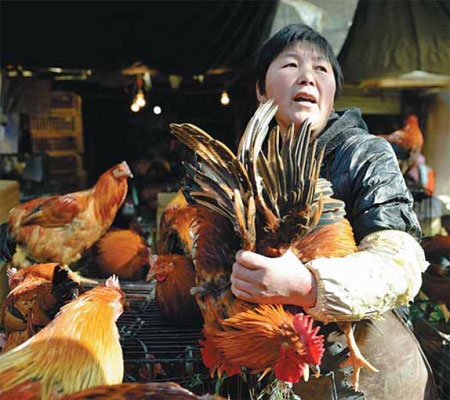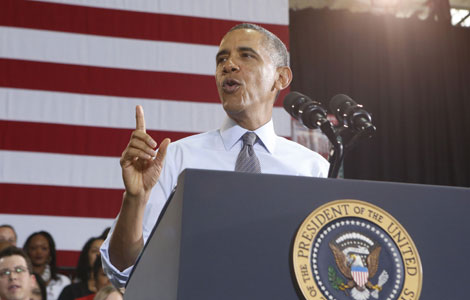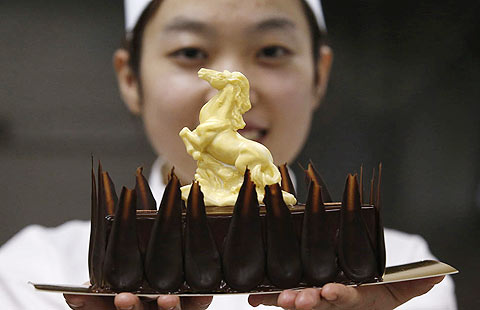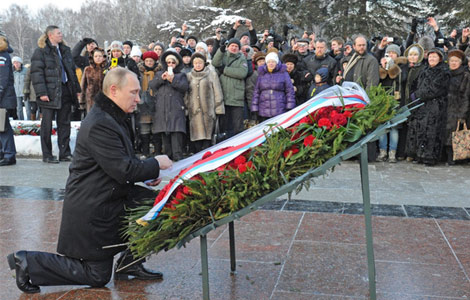Poultry is safe from H7N9 if cooked properly, official says
Updated: 2014-01-30 08:24
By Jin Zhu (China Daily USA)
|
||||||||
Ministry investigation shows virus found in markets, not on farms
All poultry purchased at established markets and properly cooked is safe to eat during the Spring Festival holiday since the H7N9 bird flu virus has not yet been found in the country's poultry farms, a senior agricultural official said.
"It is not necessary to give up those delicious poultry dishes made of chicken, duck and goose when relatives and friends get together during the upcoming holiday," said Zhang Zhongqiu, the official in charge of the veterinary department at the Ministry of Agriculture, said on Jan 29.
The Lunar New Year, or Spring Festival, is a peak season for domestic poultry sales and consumption.
"There is currently no proof to indicate that the H7N9 virus is directly transmitted from poultry to people. Also, the source and means of transmission of the virus are still unclear," Zhang said.

High temperatures can kill the virus, he added.
An investigation launched by the ministry and its local branches across the country show that so far, the H7N9 virus is not in the nation's poultry farms, but it has been found in live poultry markets in some regions.
Of the 33,400 samples from 2,402 sites tested since the beginning of this year, eight tested positive for H7N9, the ministry said.
The eight positive samples came from five live poultry markets in Guangdong, Fujian, and Zhejiang provinces and the Guangxi Zhuang autonomous region, it said.
In 2013, 88 out of 1.63 million samples tested positive for H7N9, coming from 26 live poultry markets spanning nine provinces - including Jiangsu, Anhui and Zhejiang - plus Shanghai, the ministry said.
Chinese authorities and the World Health Organization have said there is no evidence yet of sustained human-to-human transmission.
But limited transmission of the disease, such as between relatives in close contact, is possible.
A couple and their daughter in Hangzhou, Zhejiang, were infected by the virus one after the other, provincial health authorities said on Jan 28.
Eight new human H7N9 cases were reported on that day, bringing the number across the country this year to 110, including 20 deaths, Xinhua News Agency reported.
The WHO said on Jan 29 that the spike in cases this year was not surprising due to seasonal factors and not a virus mutation.
"Today there is no evidence that the characteristics of the virus have changed in a way that would explain an increase in cases and change in case fatality," Bernhard Schwartlander, the WHO's representative in China, told AFP in an e-mail.
It is estimated that the direct loss in domestic poultry sector will be as much as 20 billion yuan ($3.3 billion) due to the recent human H7N9 outbreak, the China Animal Agriculture Association said.
Zhang, the agricultural official, said government authorities will strengthen supervision nationwide of live-poultry markets, which could carry a risk of disease transmission.
"Measures will be launched to encourage setting up special rooms for slaughtering in such markets to isolate customers from the live poultry. Also, local governments have the right to decide whether they need to halt local sales of live poultry permanently or temporarily," he said.
jinzhu@chinadaily.com.cn
|
A vendor tries to sell live poultry at a market in Hangzhou, Zhejiang province, on Jan 28. Markets trading live birds in major districts of counties and cities, where severe cases of H7N9 were reported, will be closed for three months in the province starting on Feb 15. Long Wei / for China Daily |
(China Daily USA 01/30/2014 page4)
Most Viewed
Editor's Picks

|
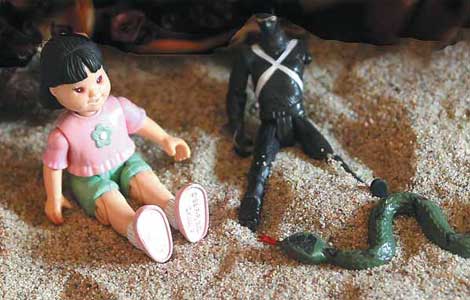
|

|

|

|

|
Today's Top News
Ambassador nominee vows to expand China ties
HK slaps sanctions on Manila
More Chinese set to travel overseas
Lenovo makes move on Motorola
China-themed malls a new trend in the Bay area
Replace dollar with super currency
Japan should learn from Germany
Bird flu prompts countermeasures
US Weekly

|

|
